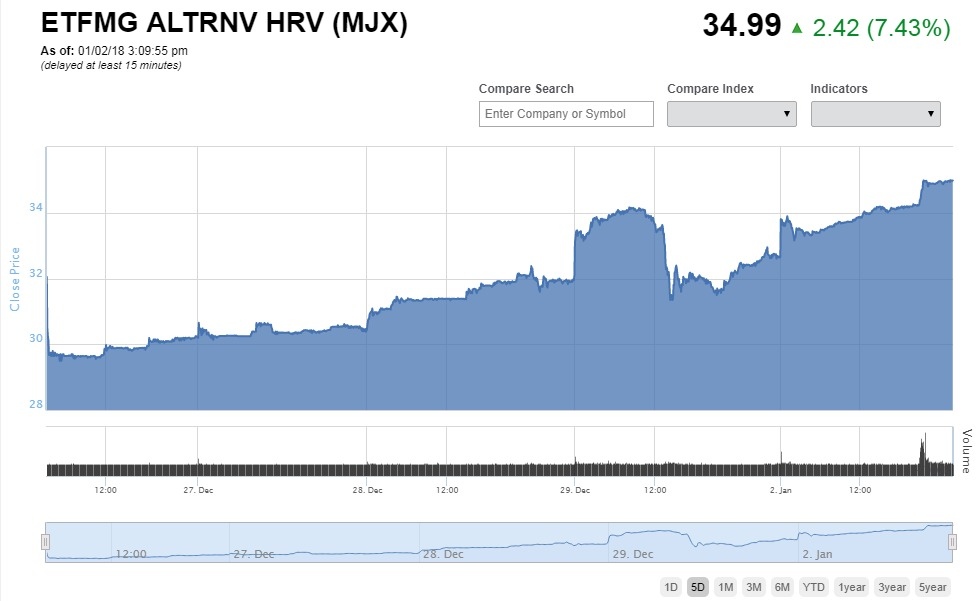Jan 2, 2018
California legalization, new U.S. ETF boost Canadian pot stocks
, Bloomberg News

Long line ups to buy marijuana in California and a new ETF sent Canadian pot stocks roaring into the new year.
THC BioMed International Ltd. (THC.CD) surged 70 per cent intraday and CannaRoyalty Corp. (CRZ.CD) jumped 27 per cent at 2:38 p.m. in Toronto on Tuesday, pushing the BI Canada Cannabis Competitive Peers Index up 13 percent to a record, extending a run that’s seen it almost triple since November.
While few Canadian companies have direct exposure to the U.S. pot market -- and may run afoul of the country’s main stock exchange operator if they do so -- brisk buying stateside might be a sign of things to come when Canada legalizes the drug by July, Beacon Securities Ltd. analyst Vahan Ajamian said.
“We believe the news of long lines and shortages helped foreshadow what we may see in Canada this summer and significantly heightened investor sentiment across the sector,” Ajamian said by email. Ajamian highlighted Ottawa-based CannaRoyalty, a cannabis investor in everything from research to brands to devices, as having one of the biggest U.S. exposures. The company is in the process of acquiring Kaya Management Inc. which licenses Bhang brand vaporizers in California.
Sophisticated Market
“January 1st marked the transition of the largest and most sophisticated cannabis market globally into a recreational adult-use market and CannaRoyalty is strongly positioned to benefit as this market grows over the next five years," said Marc Lustig, CannaRoyalty’s chief executive officer, said in a statement.
The market for marijuana in California, the world’s sixth largest economy, is expected to reach US$3.7 billion this year and more than US$5.1 billion in 2019, according to research firm BDS Analytics. Seven other states and the District of Columbia have legalized recreational weed, boosting a market that Cowen & Co. predicts will grow to US$50 billion by 2026, up from $6 billion in 2016.
ETFMG Alternative Harvest, a U.S. exchange-traded fund that started trading on Dec. 26 may also be attracting investors. The ETF is dominated by Canadian stocks, including Cronos Group Inc., Canopy Growth Corp. and MedReleaf Corp and has risen 13 per cent to a market value of almost US$48 million. Canada’s Horizons Medical Marijuana Life Sciences ETF reached a value of $540 million after hitting a record.

"The cannabis industry is projected to quadruple in size in the next 10 years, and a Canadian ETF’s success shows the potential for a U.S. hit," Bloomberg Intelligence analysts Eric Balchunas and Kenneth Shea wrote on Dec. 20.
Canadian Prime Minister Justin Trudeau has committed to full legalization of recreational use of marijuana by July of this year and governments have said they aim to keep taxes on legal weed low to squeeze out criminal dealers.
The TMX Group Inc., the parent company for sister bourses Toronto Stock Exchange and TSX Venture Exchange, has said companies that flout U.S. federal law -- which makes pot use illegal -- could ultimately be delisted. Others such as the Canadian Securities Exchange are taking a more relaxed approach.







